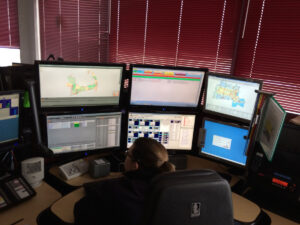
Need a good reason to start coming to Infrastructure committee meetings? We take great field trips.
This month we were invited to the Sheriff’s office at the Barnstable House of Corrections. While this may not be on many lists of places people want to go, our invitation included a tour of the emergency response center.
The idea for this center began with a million dollar Homeland Security grant. There was already a good communication center at the fire station on Otis Air Force Base, so the Sheriff’s department enlarged their communications and moved in. They do such a good job and are so cost efficient, it has continued to grow. They now dispatch for ten fire departments, provide ambulance to emergency room communication for all the hospitals, and dispatch 911 calls to eight towns.
Some of the smaller towns they provide service for originally planned to handle their own 911 calls, but realized they couldn’t handle the traffic. Dispatchers for one town can provide mutual aid if something happens in another town. They also do mutual aid with fire stations and ambulances. The goal is to keep them within six minutes response time.
The most frequent question people have about the combined call center is “how will they know where I am if they don’t live here.”
Part of the answer is, of course, technology. Lost in the fog in your kayak in Wellfleet? They can map to your phone.
They also did a lot of homework, going back decades. They asked, and they researched. So if you call and say, “I’m across the street from where (fill in the blank) used to be,” they know where you are. If you don’t speak English, they patch the call through a translator.
The tour was led by Sheriff Cummings, Special Sheriff Jeff Perry, and Peter Thomas, Chief Deputy of Communications. We saw the 911 equipment room, the IT room, the servers and the dispatch room.

The building was already designed when they arranged to be here, so the rooms are smaller than they’d like. But everything is fastidiously placed, making the best use of the space they have. The IT room is flanked with beautifully bundled cables and rows of rack space. It’s climate controlled, with a raised floor so everything comes in from below. Despite several lightning strikes, they haven’t skipped a beat.
A strong case can be made that regional system saves money for the towns, but more importantly it improves service because of added, dedicated resources. This is all the dispatchers do. They’re not monitoring inmates, greeting public or juggling office work. All the coordination of mutual aid happens here. Everyone is cross trained. They work as a team.
They currently service eight towns. If all 15 Cape Cod towns join, the center will have to double the resources they have. They’re currently looking for a new building, at which point they will use this building as a backup.
“We are built for speed and were built to grow,” Thomas said.
In other news:
Comcast is extending Internet Essentials. Students who are eligible for lunch programs qualify for inexpensive internet service and a Net Book for $150. Masons have also been placing donated, refurbished computers in schools in their “Laptops for Kids” program. The Orleans Masons have been refurbishing these laptops in house.
Mark your calendars for the Smarter Cape Economic Summit on May 12 at Wequassett Resort and Golf Club in Harwich. More details to come.
